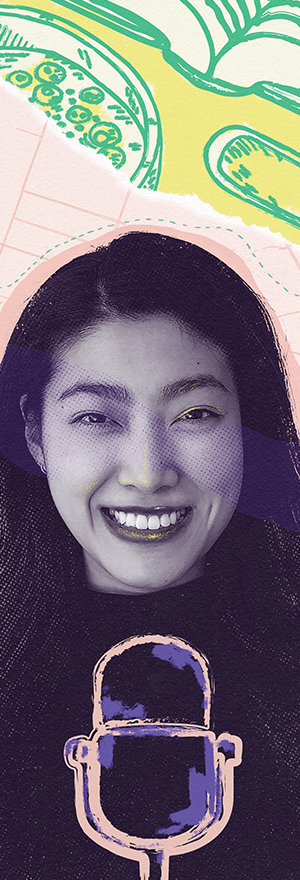A voice for science literacy
Xin Wen Zhang, BMSc’18, is pursuing her PhD at the University of Cambridge, thanks to a Bill and Melinda Gates Foundation scholarship in recognition of her commitment and work in promoting accessible science education opportunities
By Alexandra Burza, MMJC’19
 The University of Cambridge was the ideal place for Cindy Xin Wen Zhang, BMSc’18, to pursue her PhD in reproductive physiology. While many are attracted to the prestige of the institution, for her it was about access to resources and expertise from which she knew her research would benefit.
The University of Cambridge was the ideal place for Cindy Xin Wen Zhang, BMSc’18, to pursue her PhD in reproductive physiology. While many are attracted to the prestige of the institution, for her it was about access to resources and expertise from which she knew her research would benefit.
“It wasn’t as much about chasing the school as much as it was finding a professor whose research interests align with mine. I already had a project idea which came with some requirements,” she explained. “An ideal supervisor needed animal models and access to placentas, which are understandably very specific resources.”
A colleague of her graduate supervisor at the University of Cambridge happened to have both the research focus and access to models Zhang needed. There was just one major hurdle, familiar to most researchers, that she had to overcome: funding.
To cover the cost of tuition, living expenses and the move to the United Kingdom, Zhang knew she needed to apply to scholarships. As offers came in, she said she felt humbled and excited. But there was one scholarship that was most anticipated by Zhang, and that she decided was worth holding out for.
To Zhang, finding out that she would be a Gates Cambridge Scholar felt like validation.
“It’s more than just academics; they consider your leadership and community work, and most importantly what potential you have to change lives with your PhD work,” Zhang said.
The Gates Cambridge Scholarship, established by the Bill and Melinda Gates Foundation, provides comprehensive funding for 80 international postgraduate trainees annually.
“I couldn’t believe that I was capable of being recognized in this way. I didn’t think of my volunteer work as a personal achievement because I was just trying to help fill a need in my community.”
Zhang, who volunteers with supplemental Science, Technology, Engineering, the Arts and Mathematics (STEAM) education initiatives for school-age children and youth in Toronto, is herself also a testament to the importance and impact of this type of community work.
It was through Sci High, the same organization with which she now volunteers, that she first developed a love of science and research. In high school, she competed in science fairs run by the organization. Sci High also helped her acquire a research internship at Mount Sinai Hospital.
“It opened my eyes to a whole new world, and showed me how much there was to science beyond the high school lab. That’s why it’s important to me that we make more of these programs available and spread awareness in the community. If my teacher at the time didn’t know about it, I wouldn’t have had this opportunity.”
Now, she travels to schools around the Greater Toronto Area, leading a group of volunteers in doing hands-on science demonstrations and arts-related programming. In her spare time, she hosts a podcast on the topic of science communication and literacy, hoping to show that science can be accessible to anyone, even outside the classroom.
Zhang also brought this passion to campus as a medical sciences student at Schulich Medicine & Dentistry, establishing the Founder’s Network and the Future View conference, initiatives aimed at encouraging technological literacy and entrepreneurship among her peers.
Her advocacy for accessible science education is what first drew her to reproductive health and the developmental origins of disease during her medical sciences degree.
“A lot of women, and people in general, don’t know that much about their own reproductive health. We have a long way to go in terms of public education on the subject,” she said.
“Reproductive physiology and fetal development is to me, where health begins. If you can identify risk factors during pregnancy, then you have the potential to prevent chronic diseases that last a lifetime.”
Zhang’s PhD research will focus on the impact of maternal obesity on immune activity and placental function during pregnancy, building on her graduate work at the University of Toronto. There, she studied the impact of seasonality and seasonal depression on maternal immune activity.
Once at the University of Cambridge, Zhang says she wants to continue her community development work, and looks forward to experiencing a different education system and the potential lessons for her advocacy that may hold. She also looks forward to engaging with the community of Gates Scholars on campus.
“It was incredible to be recognized among all of these other exceptional international scholars, and there will be events and networking opportunities for us to connect. Gates Scholars often collaborate with each other as well on various initiatives, and I am very excited for those opportunities.”








